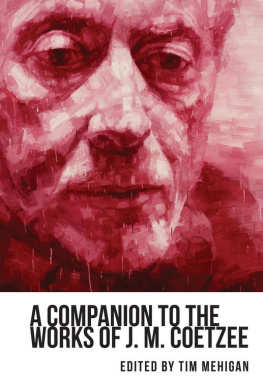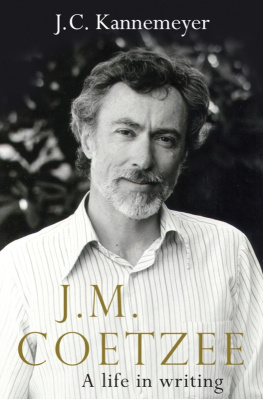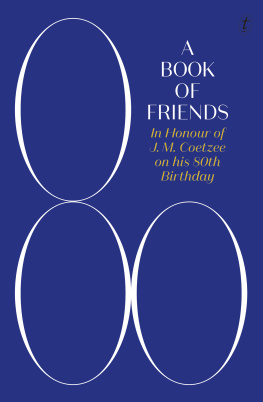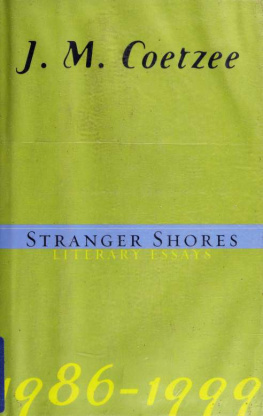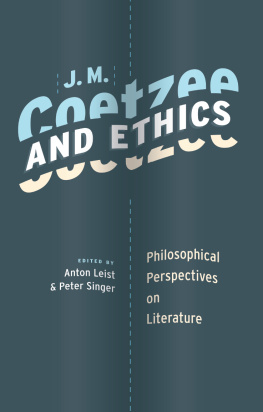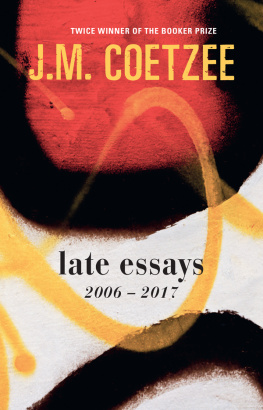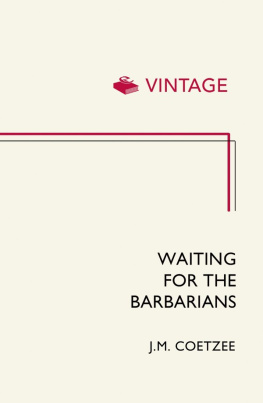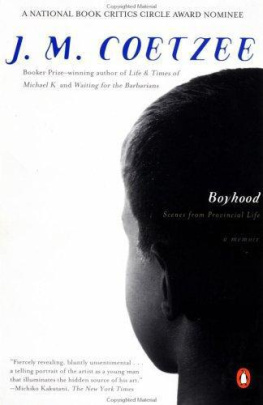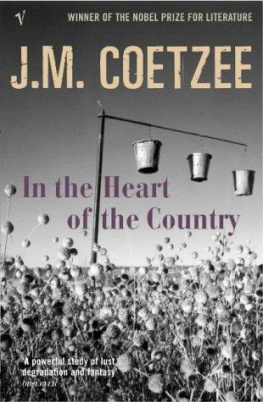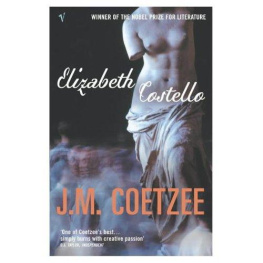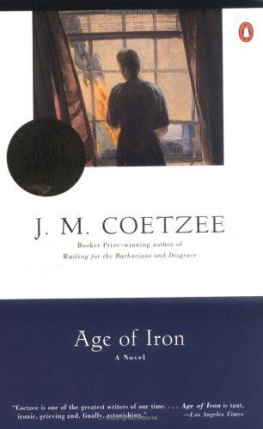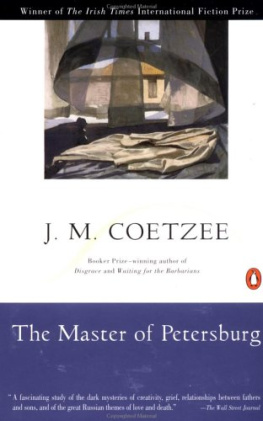J. M. Coetzee is perhaps the most critically acclaimed bestselling author of imaginative fiction writing in English today. He received the Nobel Prize for Literature in 2003 and is the first writer to have been awarded two Booker Prizes. The present volume makes critical views of this important writer accessible to the general reader as well as the scholar, discussing Coetzees main works in chronological order and introducing the dominant themes in the academic discussion of his oeuvre.
The volume highlights Coetzees exceptionally nuanced approach to writing as both an exacting craft and a challenging moral-ethical undertaking. It discusses Coetzees complex relation to apartheid and post-apartheid South Africa, the land of his birth, and evaluates his complicated responses to the literary canon. Coetzee emerges as both a modernist and a highly self-aware postmodernist-a champion of the truths of a literary enterprise conducted unrelentingly in the mode of self-confession.
Contributors: Chris Ackerley, Derek Attridge, Carrol Clarkson, Simone Drichel, Johan Geertsema, David James, Michelle Kelly, Sue Kossew, Mike Marais, James Meffan, Tim Mehigan, Chris Prentice, Engelhard Weigl, Kim L. Worthington.
[A]n excellent introduction to the scope of Coetzees work and a fine contribution to the wealth of scholarship about him. [A] cast of established and emerging Coetzee scholars offer[s] probing and engaging discussions of individual works [from throughout Coetzees career]. [A] durable and reliable guide for readers at all levels. Highly recommended. CHOICE.
Studies in English and American Literature and Culture
Contents
V OLUMES SUCH AS THESE are the labor of many hands and many minds. I would like to acknowledge, first and foremost, the skill, dedication, and constant good humor of the scholars who have participated in this project. I thank Brittany Travers and Helen Churchman, who helped me locate sources and organize the final state of the manuscript. The volume has profited from comments provided by two anonymous reviewers. I thank these reviewers for their suggestions. I am grateful to the University of Chicago Press for permission to reprint part of Derek Attridges 2004 study, J. M. Coetzee and the Ethics of Reading: Literature in the Event. I thank the Art Gallery of New South Wales and Adam Chang for permission to use Adam Changs portrait of John Coetzee on the cover of this volume. I am indebted to Jane Best and Edward W. Batchelder for their production expertise and copyediting assistance. I also acknowledge the generous support and encouragement extended to me by Jim Walker at Camden House it was he who first suggested this project to me. Thanks, finally, to the University of Otago for providing a supportive environment in which to conduct this project.
T. M.
July 2011
| AI | Age of Iron (Harmondsworth: Penguin, 1991) |
| B | Boyhood. Scenes from Provincial Life (London: Secker & Warburg , 1997) |
| BY | Diary of a Bad Year (London: Harvill Secker, 2007) |
| D | Dusklands (London: Vintage, 1974) |
| DG | Disgrace (London: Secker & Warburg, 1999) |
| DP | Doubling the Point: Essays and Interviews, ed. David Attwell (Cambridge, MA: Harvard UP, 1992) |
| EC | Elizabeth Costello: Eight Lessons (New York: Knopf, 2003) |
| F | Foe (1986; repr., Harmondsworth: Penguin, 1987) |
| GO | Giving Offense: Essays on Censorship (Chicago and London: U of Chicago P, 1996) |
| IHC | In the Heart of the Country (Johannesburg: Ravan Press, 1977) |
| IW | Inner Workings: Literary Essays 20002005 (New York: Viking, 2007) |
| LA | The Lives of Animals (Princeton: Princeton UP, 1999) |
| MK | Life & Times of Michael K (London: Random House, 1983) |
| MP | The Master of Petersburg (London: Vintage, 1995) |
| S | Summertime. Scenes from Provincial Life (North Sydney, NSW: Knopf, 2009) |
| SM | Slow Man (2005; repr., London: Vintage, 2006) |
| SS | Stranger Shores: Essays19861999 (London: Random House, 2002) |
| TA | Truth in Autobiography (Durban, South Africa: U of Cape Town P, 1984) |
| WB | Waiting for the Barbarians (Johannesburg: Ravan Press, 1981) |
| WW | White Writing: On the Culture of Letters in South Africa (New Haven, CT: Yale UP, 1988) |
| Y | Youth (London: Secker & Warburg, 2002) |
Tim Mehigan
J . M. C OETZEE IS O NE OF THE MOST IMPORTANT writers in the world today. He is also one of the most distinguished: he was the first writer to win the Booker Prize on two occasions (1983 and 1999), and the second South African writer, after Nadine Gordimer, to receive the Nobel Prize for Literature (2003). He is the recipient of numerous other literary awards including the Prix Femina tranger, the Commonwealth Writers Prize, and the Jerusalem Prize for the Freedom of the Individual in Society.
Although he writes in English and was raised speaking English at home in his native South Africa, Coetzees parents were of Afrikaner descent and his family origins date back to the arrival of the first Dutch settlers in South Africa in the seventeenth century. While later to spend significant periods of time abroad in England and the United States, Coetzee spent his early life in Cape Town and the nearby town of Worcester in the Western Cape. After a Catholic schooling with the Marist Brothers in the Cape Town suburb of Rondebosch, he matriculated to the University of Cape Town in 1957, successfully completing honors degrees in English and mathematics in 1960 and 1961. From 1962 to 1965 he worked as a computer programmer in England while undertaking research for a masters thesis on the English novelist Ford Madox Ford. He was awarded the degree of Master of Arts by the University of Cape Town in 1963. From 1963 to 1980 he was married to Philippa Jubber, a bond that produced two children: Nicolas, born in 1966, and Gisela, born in 1968. Nicolas died in an accident in 1989.
In 1965 Coetzee traveled to the United States, beginning graduate studies in linguistics at the University of Texas with the support of a Fulbright scholarship. His doctorate on the early fiction of Samuel Beckett Coetzee took up the first in a series of positions at the University of Cape Town teaching English literature. He retired from the university as Distinguished Professor of Literature in 2000 and emigrated with his partner Dorothy Driver to Australia two years later. He now lives in Adelaide, South Australia.
Coetzees biography is closely connected with some of the most momentous events to have taken place since the Second World War. These events include the period of apartheid and white minority rule in South Africa from 1948 to 1994, the tumult of the antiwar movement in the United States in the late 1960s and early 1970s, has only served to undermine the fragile process of reconciliation underway in that country. Against this predominantly South African opinion must be weighed the sheer number of international plaudits he has received and, among them, statements such as those of the Swedish Academy in its 2003 citation for the Nobel Prize. In this citation Coetzee is praised for portraying the surprising involvement of the outsider in his works a statement that recognizes the profound nature of his moral, if not also his political, commitments in relation to the postwar history of his homeland.

